The Thaumaturge review - a refreshingly different Polish RPG
A sight Warsaw eyes.
Lurking behind a dated exterior is a limited but sophisticated RPG with a unique setting and some memorable new ideas.
I think it counts for a lot when a role-playing game comes along and it's different. There are so many games that try to do what other games do, they end up struggling to stand out - especially when they don't have the resources larger projects do. But with Thaumaturge, developer Fool's Theory (the Polish studio remaking The Witcher 1 for CD Projekt Red, by the way) has played it smart. It's focused on the differences and not been afraid to leave other things out, and it means that behind Thaumaturge's admittedly dated exterior, there are some genuinely interesting things here.
There's a lot about The Thaumaturge I admire. Let's take the setting and the subject matter first, because it also helps explain the game. Do you know what a Thaumaturge is? I doubt it - I didn't either. It's a term taken from our real world to mean a person who performs miracles or wonders. Specifically, in this game's case, a Thaumaturge is capable of reading people's thoughts (and influencing them), seeing those thoughts imprinted on objects, and befriending demons. And within that description are the game's big ideas.
Really, The Thaumaturge is a detective game, because nearly everything you're asked to do in the game involves going to an area and looking for clues that have emotional imprints on, and finding enough of them to draw a conclusion about the case in question. You then present this to someone, there's maybe a punch-up, and then you do it all again. Broadly, that's the loop of the game. There's no looting, no trading, none of that - in fact there's no inventory at all. It's quite a breezy experience because of it.
Demons are a key part of all of this. They're thematically what empowers you as a Thaumaturge, each Thaumaturge supposedly having one, a demon - and some having more than one. They fight with you, they empower you outside of combat, and they're what gives you an edge. They're a bit like Pokémon, only warped and twisted versions of them (they're all pulled from folklore and their backgrounds make for some fascinating reading in the game's codex). Your character Wiktor often talks to his demon, Upyr, not that you can understand what it says, though Wiktor apparently can. It's his lifelong friend and has been with him since he was a boy.
Demons have a variety of abilities to use in combat that you can queue up alongside your attacks. Combat is turn-based and revolves around a timeline idea, which I haven't seen before, not in the way it's used here. When you fight, you'll see a timeline above the battlefield showing when attacks will happen - and sorry for the sudden lurch into mechanics but it feels a bit like this in the game too, when it's all thrown at you at once.
You'll want to get your hits in first but your fastest attacks are your weakest, so the question is, what will you do? The answer lies in levelling up and unlocking more abilities and more modifiers for them, which you can switch around at will. Perhaps you want to slow enemy attacks or break them, or maybe you want to deplete their Focus gauge and open them up for devastating strikes - there's a number of different ideas to build around. It's engaging; never particularly challenging, but a pleasant thought exercise.
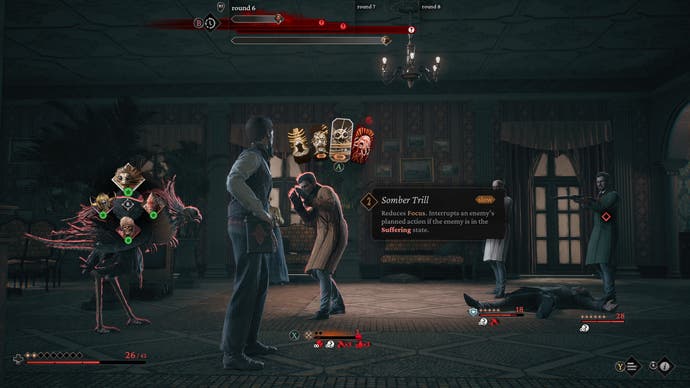
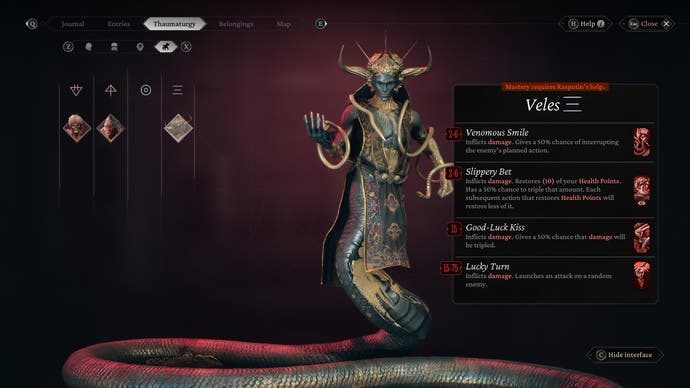
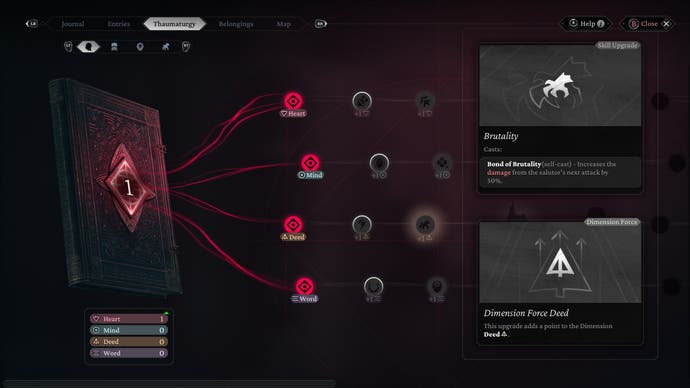
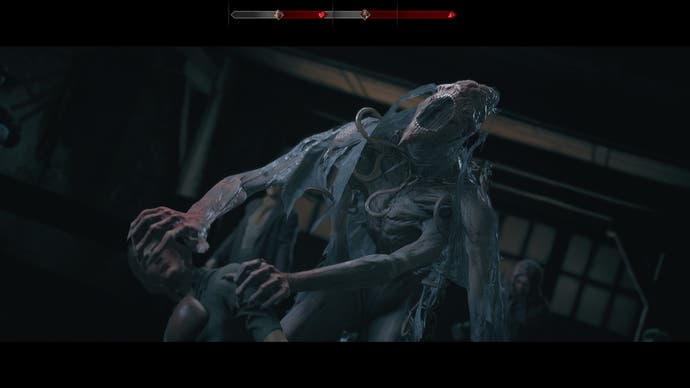
The skill tree where you unlock new abilities also has a double-use outside of combat. The four skill paths - Heart, Mind, Deed, and Word - determine what clues you can clean from the world around you, providing you have a high enough score. They also enable you to use certain options in dialogue when you're in a 'manipulate' moment. You'll get so many points you can usually do everything, but later in the game, some were off-limits. It was particularly annoying when it was due to a skill tree halting my progress because I hadn't collected a certain demon, but then I did ignore plenty of side quests.
Finding demons usually occurs in major storied moments, then, but I didn't catch them all. Thematically, discovering demons is tied to Flaws, which are personality traits like pride, which is a nice idea. Once you lure one out by encouraging someone's Flaw, you have to fight a kind of boss battle and then you can capture it. Pride is the Flaw you begin with as Wiktor, and you can use it in dialogue, too - the more you use it, the stronger it gets. You can take Flaws from other characters as well, not that they become usable in dialogue, from what I can tell. Flaws are a nice idea but feel inconsistently used to me.
Detour over; I want to get back to the game's setting because it's another particular part of The Thaumaturge I admire. This is turn of the century Poland - the other century, the 20th one - and Warsaw specifically, a setting we see hardly at all. We hardly see it in the real-world, either, because so much was destroyed in World War 2, so it's a really valuable lens into history. It feels authentic and personal, too, this being made by a Polish developer, and you can feel the desire to show off this great city coming through. At times it's like a playable history lesson, as you collect historic detritus like magazine covers and view old photographs and artwork. There's a particularly nice sketchbook-type effect at points of interest where you see an artist's interpretation of people eating doughnuts at the time, for example - apparently they were very popular. The attention to detail in this regard is superb.
.jpg?width=690&quality=75&format=jpg&auto=webp)
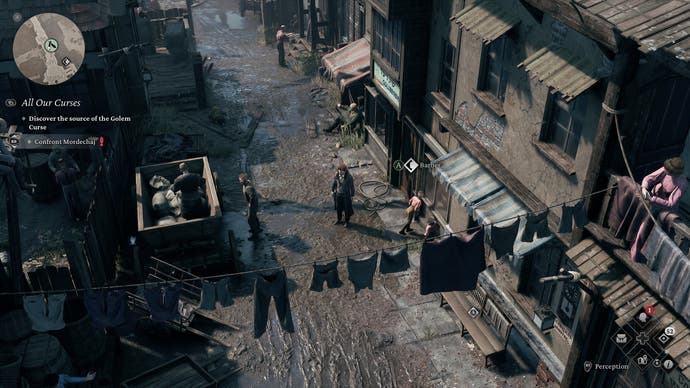
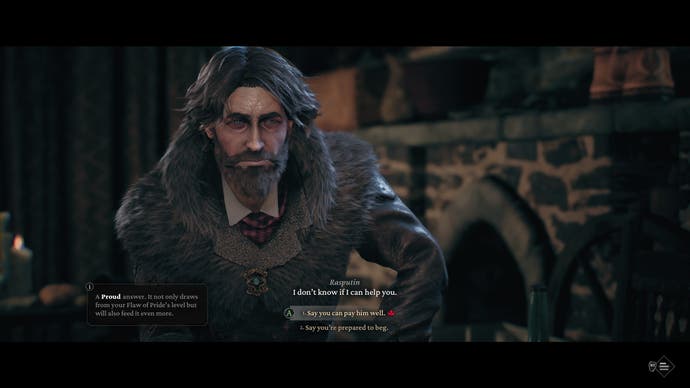
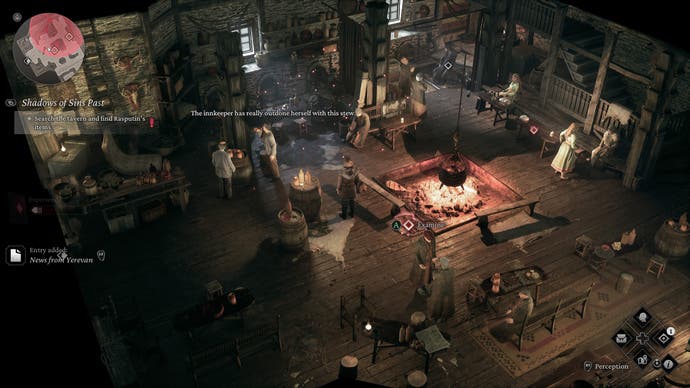
The setting also provides the politically charged backdrop of Russian occupied Poland for the story, and some famous and notorious characters from history to play with, such as Tsar Nicholas II Romonov, the last Russian Emperor, and Rasputin. Rasputin is actually a close friend of yours in the game - you being Wiktor Szulski, a wayward member of the Polish upper class, returning home after many years following the sudden and mysterious murder of your father, who you had a difficult relationship with. Did it have anything to do with Thaumaturgy?
The breadcrumb trail will take you all around Warsaw and introduce you to a cast of lively characters, some of which are stereotypically off-the-wall - like your childhood friend Abaurycy, who's now an aspiring crime lord but also a poet and runs a pub - though others like your twin sister Ligia are more considered. She, for instance, longs to work at a university but is stifled by the attitudes towards women at the time. There's, quietly, a progressive heart in this game, and the women are great examples of it.
It speaks to a quiet kind of sophistication that's in The Thaumaturge, which might not be immediately apparent but gradually comes through. It's there in the way the game probes people's thoughts, emotionally and philosophically, and wonders what drives them - writing that I found endlessly interesting to read despite being asked to do it over and over again. It's there in the respectful portrayal of Jewish culture in Warsaw, which winds its way into the main story, and it's there in observations of socio-economic difficulties of the time, and the care taken over portraying them.
I also want to congratulate whoever decided Wiktor should be a calm character and not someone who huffs and puffs and shouts and screams, because his easy going charm makes him a pleasure to be around. I sat all the way through the credits just so I could shout out Maciej Nawrocki's voice work for precisely this reason. It reminds me a lot of the Castlevania Netflix series and the way Trevor Belmont is voiced, by Richard Armitage, there - and that's as high a compliment as I can think of! I wish more games took this approach. It's lovely to see a cast filled with Polish actors, too - homegrown talent whose accents are not only legit but can properly pronounce the names and terms the script calls for. It's all refreshingly different to hear.
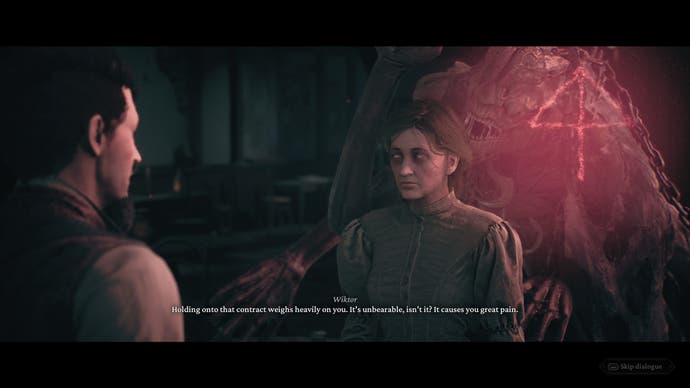
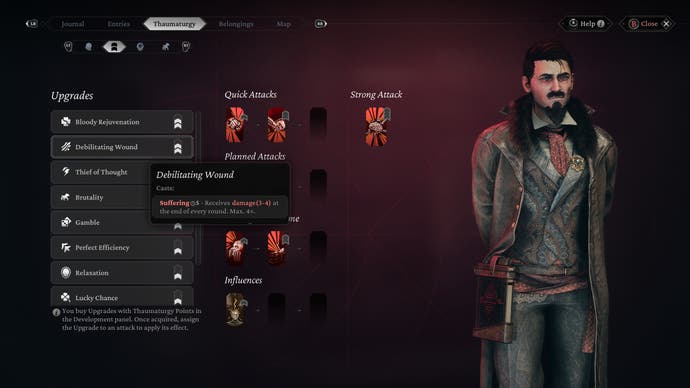
.jpg?width=690&quality=75&format=jpg&auto=webp)
Look, there are obvious limitations to The Thaumaturge. You don't really do all that much in it, besides go somewhere, look around, read, then fight (and I'm still not sure how believable it is to have a magician be an excellent physical fighter too) and when you start branching out into side-quests and ancillary objectives, this is exacerbated. Traipsing back and forth across Warsaw to do the same thing over and over again, however much Fool's Theory tries to dress it differently, quickly becomes a chore. Worse, it starts to eat into the enjoyment of the more carefully authored main missions in the game. Which is a shame, because there are some genuinely interesting ones, either shining a light on important political attitudes at the time, or opening little windows through which to see Warsaw as it once was.
There's also no escaping the general aesthetic of the game, which is unfortunately dated, depending heavily on a few character models reused over and over. Having said that, the city feels populated and lively, and where conversations matter a spirited attempt at cinematic presentation has been made. It feels like it's a case of making the best use of limited resources, but it's lacking nonetheless. There's a long way to go to reach the kind of presentation CD Projekt Red will want with the remake of The Witcher 1.
That aside, there's lots of nice stuff here. The Thaumaturge isn't overbearing or demanding, and I've spent a pleasant 20 hours or so with it. It's, gently, a persuasive little package. More importantly, I'll remember it. I'll remember all the many ways it's not quite like anything else I've played. There's enough here to mark Fool's Theory as a studio to watch.
A copy of The Thaumaturge was provided for review by 11 bit Studios.










